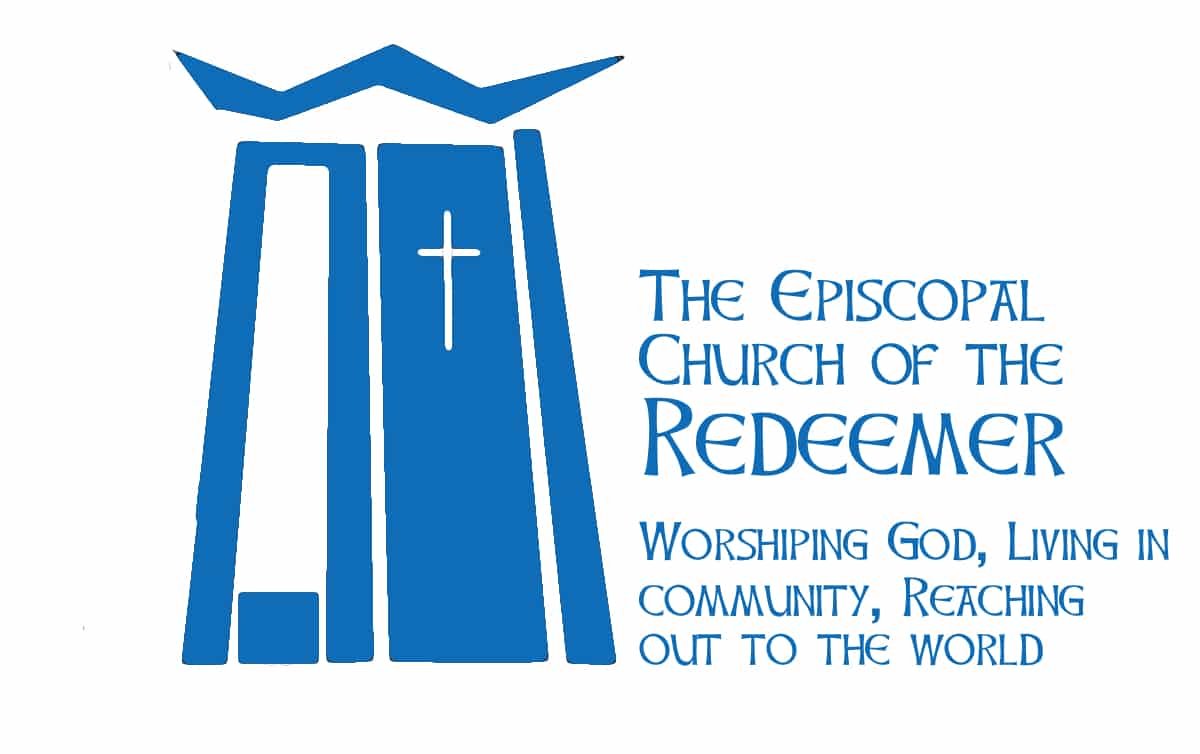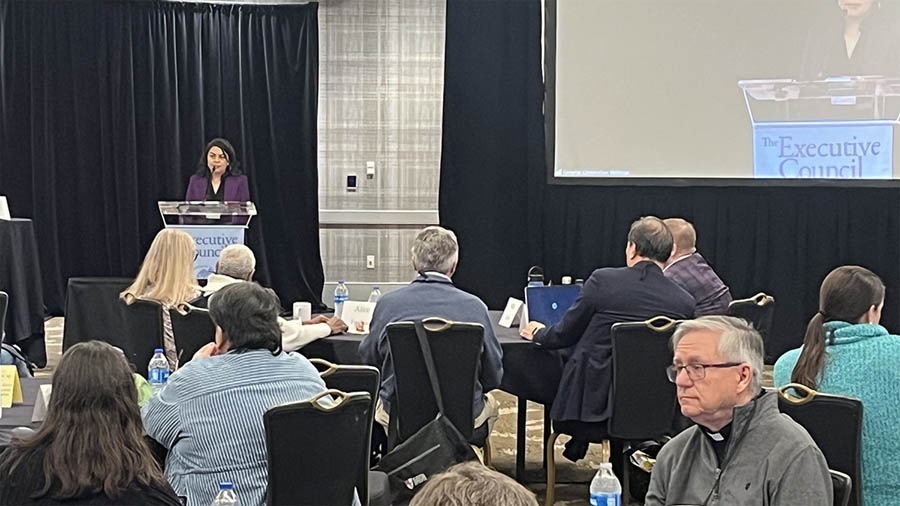[Episcopal News Service – Louisville, Kentucky] The Episcopal Church Executive Council is meeting in the host city for the upcoming 81st General Convention. It expects to focus much of its four days here on discussion and approval of a 2025-27 churchwide budget plan. This setts up final adoption of the $143 million plan in June at General Convention.
Presiding Bishop Michael Curry
With Presiding Bishop Michael Curry recovering at home in Raleigh, North Carolina. He had a medical procedure to address a recurring subdural hematoma, or brain bleed, House of Deputies President Julia Ayala Harris is chairing the January 26-29, 2024, meeting of Executive Council.
“His spirit and leadership remain ever present with us and in our church,” Ayala Harris said in her opening remarks January 26. She shared words of gratitude from Curry himself for all the prayers for his health.
“Fervid prayer and competent medicine are a powerful partnership,” Curry said in his message to Executive Council, as relayed by Ayala Harris. “Thank you to all of you who have been praying for my family, the medical teams and for me.”
Pilgrimage to Tanzania
Ayala Harris devoted part of her opening speech to describing a “profoundly moving” pilgrimage to Tanzania. She joined this month with two other members of Executive Council, the Rev. Charles Graves and Alice Freeman. They were guests of Episcopal Relief & Development.
“We were there to witness firsthand the partnership between Episcopal Relief & Development and the Anglican dioceses in Tanzania,” she said. “Together they are working to further our collective witness of the love of Jesus Christ.”
The Episcopal pilgrims visited sites in the Diocese of Central Tanganyika. They learned about some of the ministries supported by the relief agency. This included a savings and lending program devoted to financial empowerment of local residents, especially women.
“The women who run these groups demonstrate for us incredible leadership traits: clarity of role, accountably to one another, desire to give and share one’s gifts together, the building of deep bonds of trust and relationship,” Ayala Harris said.
Graves and Freeman are expected to share more details about the pilgrimage during committee discussions at this meeting of Executive Council. These discussions are taking place at the Galt House, a historic hotel and conference center overlooking the Ohio River in downtown Louisville.
The Executive Council

Galt House is about a block north of the Kentucky International Convention Center, where the 81st General Convention is scheduled to convene June 23-29. One of the Executive Council’s central actions will be adoption of a triennial churchwide budget plan. This plan is based on recommendations of Executive Council, which is the church’s governing body between meetings of General Convention.
The presiding bishop and House of Deputies president serve as chair and vice chair of Executive Council, respectively. Its other 38 voting members are a mix of bishops, other clergy and lay leaders. General Convention elects 20 to staggered six-year terms – or 10 new members every three years. The Episcopal Church’s nine provinces elect the other 18 to six-year terms, also staggered. Executive Council typically holds meetings three times a year. The next is scheduled for April 2024 in Raleigh.
Executive Council considers draft budget for 2025-2027
In the afternoon January 26, Executive Council’s Joint Budget Committee presented its $143 million draft plan for 2025-27. The Budget Committee finalized the plan earlier this month at an in-person meeting. The committee chair is the Rev. Patty Downing, an Executive Council member from the Diocese of Delaware. The rest of the committee includes both Executive Council members and other clergy and lay leaders who are familiar with church finances.
Executive Council is to vote on the draft budget plan Jan. 28, after which it will advance for presentation and floor debate at the 81st General Convention in June.
The Joint Budget Committee is recommending that the church maintain its current 15% assessment rate on diocesan income. The assessments are the largest revenue source, 64%, of the churchwide budget. Some dioceses are expected to ask General Convention to cut the rate to as low as 10%. The committee estimates a 10% assessment would create a $30 million shortfall in the three-year budget.
After table discussions, members of Executive Council rose to offer feedback on the draft plan.
- Some said they agreed that the church should not change its assessment rate.
- They spoke in favor of a separate decision not to ask Episcopal Relief & Development to begin contributing to the churchwide budget in exchange for the services it receives from church departments.
- Others suggested the draft budget plan doesn’t fully fund some of the church’s priorities. This includes creation care, youth, and young adult ministries.
Are we a church that is more focused on the size of our endowment, or are we a church focused on doing actual mission work?”
Joe McDaniel, from the Diocese of the Central Gulf Coast
Investment portfolio draw proposal
One sharp point of contention was the Joint Budget Committee’s decision not to increase the amount of money the church draws annually from the returns on its $167 million unrestricted investment portfolio. Joe McDaniel, an Executive Council member from the Diocese of the Central Gulf Coast who is not a member of the Joint Budget Committee, has proposed raising the investment draw to provide more money in the budget to support the church’s mission and ministry priorities.
McDaniel’s resolution is due for an evening discussion on January 26 by Executive Council’s Finance Committee. During a break earlier in the day, he specified to Episcopal News Service that he proposes increasing the draw to 5.42%. He said this would add $3 million over three years to the budget. This would be “a prudent course of action” to do the following:
- Increase funding to The Office of African Descent Ministries.
- Set aside money for General Convention resolutions.
- Support ministries favored by the next presiding bishop, who will be elected in June and installed in November.
McDaniel read a statement further detailing his proposal during Executive Council’s afternoon budget discussion. “Are we a church that is more focused on the size of our endowment,” he said, “or are we a church focused on doing actual mission work?”
It isn’t clear whether McDaniel’s proposal can garner the support of a majority of Executive Council. Some members have expressed skepticism. Diane Pollard, a member from the Diocese of New York, spoke during the morning plenary of “the wisdom of being careful” by maintaining the church’s more conservative approach to its investments. “I think that what we do today affects people many, many years after.”
Historic investment portfolio draw
The church in recent budgetary cycles has settled on a 5% draw from its investments. This is applied to a rolling five-year average of investment returns. Chief Financial Officer Kurt Barnes, who also serves as the church’s treasurer, said January 26 in his report to Executive Council that the church is likely to end 2023 with a strong 16% return on its investments, though he cautioned members to look beyond single-year figures.
“Past performance is not indicative of future returns. That’s always the warning,” Barnes said, citing the common truism in financial planning. The church’s five-year average of annual net returns is closer to 8.5%, he said. With inflation and other costs, this typically leaves about 5% to support the churchwide budget through the investment draw.
Church Pension Group
Executive Council’s first day also featured a presentation by leaders of the Church Pension Group. They have been meeting with members of Executive Council and other church leaders to discuss renewal of a memorandum of understanding. Church Pension Group’s incorporation is separate from the church. It manages a wide range of clergy and lay benefits for its employees.
General Convention elects 24 trustees of Church Pension Group’s board. Twelve of those seats are up for election this June in Louisville. The other 24 trustees elect the 25th trustee, the president. Kathryn McCormick, the board’s chair, asked for Executive Council to help encourage a diverse slate of candidates who have the financial expertise the board needs to be effective.
Mary Kate Wold, Church Pension Group’s chief executive officer and president, provided a brief history of the agency. Founded in 1917, she underscored its continued commitment to ensuring support for church employees, both now and in retirement.
“We are very intent that we can honor the promises made over decades,” Wold said. In some cases, that means planning for pension payments more than 70 years in the future. “That’s a long, long span of responsibility, and we take that very seriously.”
—David Paulsen is a senior reporter and editor for Episcopal News Service. You can reach Paulsen at dpaulsen@episcopalchurch.org.

Church of the Redeemer
Church of the Redeemer: Worshiping God, living in community, and reaching out to the world around us. We are an Episcopal Church serving north King County and south Snohomish County, Washington. As you travel your road, go with friends walking the way of Jesus at Redeemer.
Church of the Redeemer is at 6210 Northeast 181st Street in Kenmore, Washington. The campus is a short distance north of Bothell Way, near the Burke-Gilman Trail. The entrance looks like a gravel driveway. The campus is larger on the inside than it is on the outside. And we managed to hide a large building on the side of a hill that is not easily seen from the street.
The Episcopal Church welcomes you.





